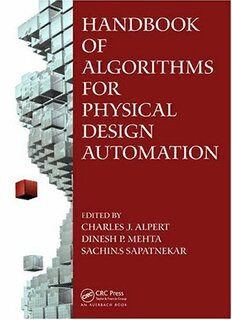Download Handbook of Algorithms for Physical Design Automation PDF Free - Full Version
Download Handbook of Algorithms for Physical Design Automation by Charles J. Alpert, Dinesh P. Mehta, Sachin S. Sapatnekar in PDF format completely FREE. No registration required, no payment needed. Get instant access to this valuable resource on PDFdrive.to!
About Handbook of Algorithms for Physical Design Automation
The physical design flow of any project depends upon the size of the design, the technology, the number of designers, the clock frequency, and the time to do the design. As technology advances and design-styles change, physical design flows are constantly reinvented as traditional phases are removed and new ones are added to accommodate changes in technology. Handbook of Algorithms for Physical Design Automation provides a detailed overview of VLSI physical design automation, emphasizing state-of-the-art techniques, trends and improvements that have emerged during the previous decade. After a brief introduction to the modern physical design problem, basic algorithmic techniques, and partitioning, the book discusses significant advances in floorplanning representations and describes recent formulations of the floorplanning problem. The text also addresses issues of placement, net layout and optimization, routing multiple signal nets, manufacturability, physical synthesis, special nets, and designing for specialized technologies. It includes a personal perspective from Ralph Otten as he looks back on the major technical milestones in the history of physical design automation. Although several books on this topic are currently available, most are either too broad or out of date. Alternatively, proceedings and journal articles are valuable resources for researchers in this area, but the material is widely dispersed in the literature. This handbook pulls together a broad variety of perspectives on the most challenging problems in the field, and focuses on emerging problems and research results.
Detailed Information
| Author: | Charles J. Alpert, Dinesh P. Mehta, Sachin S. Sapatnekar |
|---|---|
| Publication Year: | 2008 |
| ISBN: | 9781420013481 |
| Pages: | 1044 |
| Language: | English |
| File Size: | 20.406 |
| Format: | |
| Price: | FREE |
Safe & Secure Download - No registration required
Why Choose PDFdrive for Your Free Handbook of Algorithms for Physical Design Automation Download?
- 100% Free: No hidden fees or subscriptions required for one book every day.
- No Registration: Immediate access is available without creating accounts for one book every day.
- Safe and Secure: Clean downloads without malware or viruses
- Multiple Formats: PDF, MOBI, Mpub,... optimized for all devices
- Educational Resource: Supporting knowledge sharing and learning
Frequently Asked Questions
Is it really free to download Handbook of Algorithms for Physical Design Automation PDF?
Yes, on https://PDFdrive.to you can download Handbook of Algorithms for Physical Design Automation by Charles J. Alpert, Dinesh P. Mehta, Sachin S. Sapatnekar completely free. We don't require any payment, subscription, or registration to access this PDF file. For 3 books every day.
How can I read Handbook of Algorithms for Physical Design Automation on my mobile device?
After downloading Handbook of Algorithms for Physical Design Automation PDF, you can open it with any PDF reader app on your phone or tablet. We recommend using Adobe Acrobat Reader, Apple Books, or Google Play Books for the best reading experience.
Is this the full version of Handbook of Algorithms for Physical Design Automation?
Yes, this is the complete PDF version of Handbook of Algorithms for Physical Design Automation by Charles J. Alpert, Dinesh P. Mehta, Sachin S. Sapatnekar. You will be able to read the entire content as in the printed version without missing any pages.
Is it legal to download Handbook of Algorithms for Physical Design Automation PDF for free?
https://PDFdrive.to provides links to free educational resources available online. We do not store any files on our servers. Please be aware of copyright laws in your country before downloading.
The materials shared are intended for research, educational, and personal use in accordance with fair use principles.

